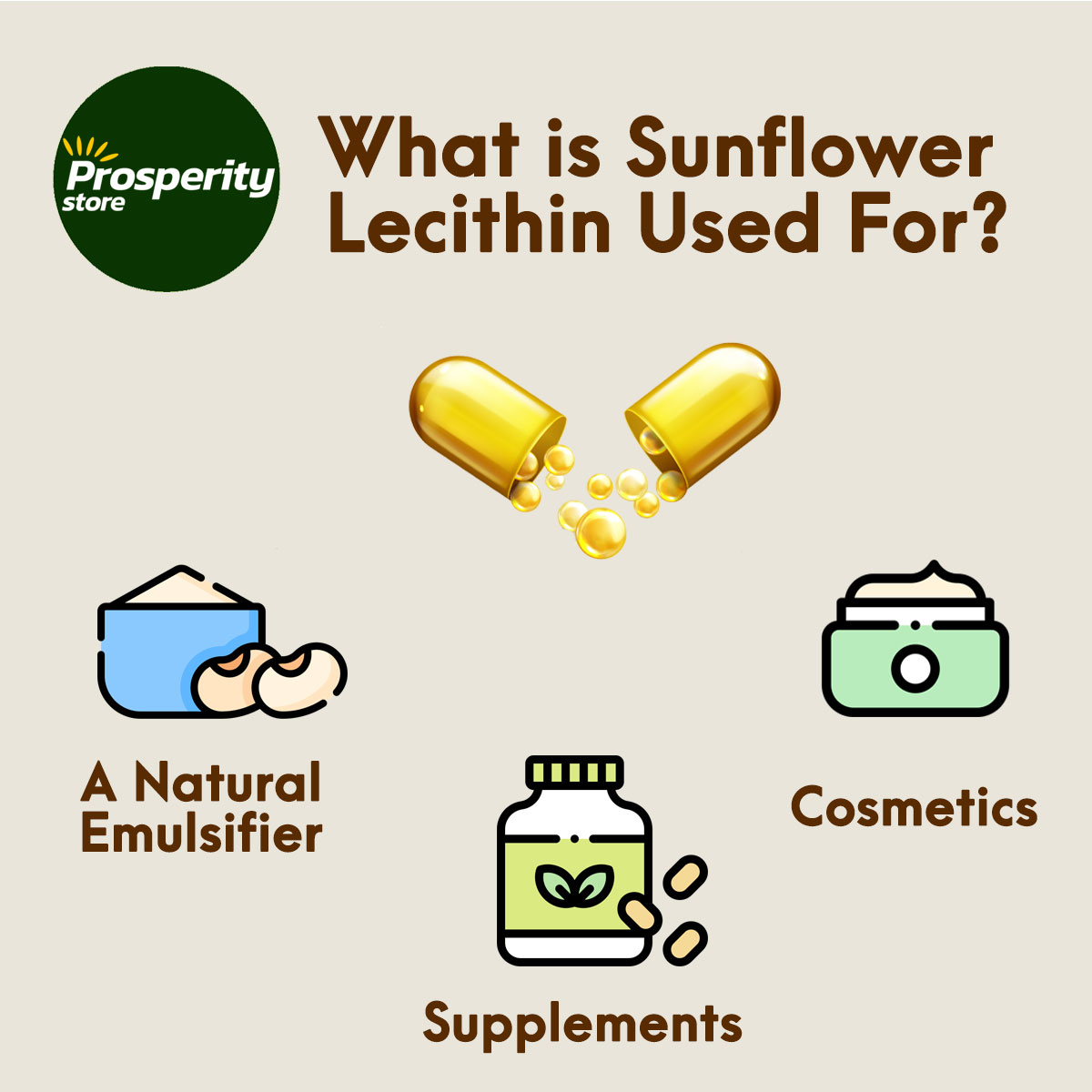Top Sunflower Lecithin Benefits
Summarize

The labels of many processed foods and dietary supplements indicate the ingredients include sunflower lecithin. What is lecithin, and why is sunflower lecithin used? All lecithin plays a role in the body and is essential for various biological functions. However, sunflower lecithin differs from most other lecithin types. It has a unique chemical composition. It is produced by a cold press extraction process that does not require harsh chemicals, and is typically non-GMO, providing a natural and safe option. It is found naturally in foods, made into supplements, and increasingly valued for the benefits the substance delivers.
What is Lecithin?
Lecithin is a generic name for a naturally occurring yellow-brown fatty substance in plant and animal tissues. It is a group of related chemicals that belong to the group of phospholipids compounds. Its chemical composition is a mixture of fatty acids, choline, choline esters, glycerol, triglycerides, glycolipids, phosphoric acid and phospholipids. Phospholipids comprise most cell membranes and are considered essential building blocks in the body. They are important parts of blood, the brain, nerves, and other tissues. Coline is a component of phospholipids.
Lecithin is used during the metabolic process and to move fats. It is a precursor of choline. Lecithin turns into choline in the body, and choline contributes to the production of the neurotransmitter acetylcholine. Acetylcholine sends chemical signals between the body’s neurons and is involved in many physical functions, including muscle contractions, brain functioning, learning and memory.
Acetylcholine binds to two types of receptors. One is the muscarinic receptors. The binding action contributes to the regulation of heart contractions and blood pressure. It moves food through the intestine by contracting the muscles in the stomach and managing stomach and intestine secretions. The other receptors are called nicotinic receptors. When acetylcholine binds to these receptors, skeletal muscles can contract, adrenaline and norepinephrine are released from the adrenal glands, and the sympathetic system is activated. The sympathetic nervous system carries signals involved in the stress response.
So, lecithin is a choline precursor, which produces acetylcholine, a neurotransmitter. Though more research is needed, several diseases have been associated with an acetylcholine shortage.
Lecithin is found in foods like the following.
- Soybeans
- Corn
- Rapeseed
- Sunflower seeds
- Egg yolks
- Organ meats like chicken livers
- Wheat germ
- Milk and dairy products like cheese and butter
- Some fish, like salmon, anchovy and mackerel
Lecithin is also available as a dietary supplement.
What Makes Sunflower Lecithin Different from Soy Lecithin?
Two of the most common types of lecithin are soy and sunflower lecithin.
One of the main differences is the type of extraction process used.
1. Extraction Process
Soybean lecithin is extracted through a degumming process. The gummy material is separated by hydrating the plant gums with water, then processing the hydrated gums with chemical solvents like hexane. This separates the non-soluble phosphatides.
Sunflower lecithin is extracted using a cold-press mechanical procedure that does not require solvents. Seeds are cleaned and then pressed to extract the sunflower oil, leaving a lecithin-rich gum. The gum is then separated from the oil using centrifugation. The extracted lecithin can be processed into a liquid, powder or granule form powder for ease of use.
2. Phosphatidylcholine Content
Sunflower lecithin has a higher phosphatidylcholine content compared to soy lecithin. Phosphatidylcholine is a major component of lecithin.
3. Allergy-prone
Soy lecithin contains soy allergens. Sunflower lecithin is allergen-free.
4. GMO
Soy lecithin is often extracted from GMO crops. Sunflower lecithin is typically non-GMO.
What is Sunflower Lecithin Used For?

Currently, lecithin is primarily used in three ways.
Emulsifier
Sunflower lecithin has a unique fat composition that makes it an ideal natural emulsifier, a food additive used to stabilize processed foods. It is used in foods like margarine, chocolate, mayonnaise, bakery goods and instant products. Sunflower lecithin can improve texture, extend shelf life, and enhance the mixability of ingredients. Lecithin is also found in ice cream, plant-based milk, processed cheese and more.
Cosmetics
Sunflower lecithin is also used in cosmetics. It is a natural humectant because it is hydrophilic. This means it attracts water content and retains moisture. It acts as an emollient to soften skin and an emulsifying agent that binds ingredients together. Sunflower lecithin is found in lotions, lip balms, moisturizer creams and hair conditioners.
Supplements
Sunflower lecithin supplements may offer potential health benefits. In the supplements, sunflower lecithin helps stabilize formulations and improve the bioavailability of active ingredients. Supplements are available in various forms, including capsules, powder, liquid extract and granules.
Health Benefits of Sunflower Lecithin
Sunflower lecithin is primarily composed of three types of phospholipids:
Phosphatidylcholine (PC)
Supports brain health and cellular function
Phosphatidylethanolamine (PE)
Contributes to membrane integrity
Phosphatidylinositol (PI)
Plays a role in cellular signaling, metabolism
Sunflower lecithin does not contain allergens and is typically a non-GMO source of lecithin. It also has more choline compared to soy lecithin. Though research is limited, studies show various lecithin health benefits.
1. Cholesterol Levels
Lecithin supports lowering total cholesterol levels by up to 42% and reducing LDL cholesterol by 56% after taking the supplements for two months. This may promote cardiovascular health.
2. Emulsifying Properties
Lecithin supplements may help women experiencing clogged milk ducts while breastfeeding by thinning out breast milk through its emulsifying properties. Sunflower lecithin is commonly recommended for breastfeeding mothers to treat clogged milk ducts.
3. Cognitive Health
Phosphatidylcholine, a significant component of sunflower lecithin, is vital for cognitive health. Some studies have found higher choline intake may improve cognitive functioning. Researchers continue to investigate whether sunflower lecithin can help manage other conditions.
4. Influence on Memory
Higher dosages of choline were found to improve memory in study participants aged 50-85 years who had poor memories.
5. A Therapeutic Agent
Lecithin has been studied as a therapeutic agent for digestive issues. The intestinal mucus layer contains phospholipids, of which approximately 70% is lecithin. People with digestive diseases experience a decrease in the phospholipid barrier. The lecithin deficiency allows bacteria to enter the mucus, causing swelling.
6. Skin Properties
Sunflower lecithin in a skin product can soothe and soften skin and strengthen the skin barrier. It can also improve the texture of hair by enhancing its moisture-retention capacity.

7. Detoxification
The phospholipids in sunflower lecithin help break down fats in the liver, potentially reducing the risk of fatty liver disease. They also contribute to liver detoxification and cellular repair.
Sunflower Lecithin Promotes Good Health
There is no recommended daily dosage amount for sunflower lecithin, but the U.S. Food and Drug Administration has designated lecithin as generally recognized as safe (GRAS). The potential side effects of sunflower lecithin include bloating, nausea, and diarrhea. It may also contribute to weight gain due to its caloric content.
Obtaining the right amount of lecithin through food sources is always ideal, but that is not always possible, especially if a medical condition is involved. If taking lecithin supplements, following the recommended dosage on the package is essential. Always consult a doctor first before beginning sunflower lecithin supplements.
Sources
- https://pubchem.ncbi.nlm.nih.gov/compound/Lecithin
- https://my.clevelandclinic.org/health/articles/24568-acetylcholine-ach
- https://pubmed.ncbi.nlm.nih.gov/16273023/
- https://www.mdpi.com/2079-9284/7/4/87
- https://www.supplysidefbj.com/fat-oils/sunflower-lecithin-a-formidable-emulsifier
- https://www.sciencedirect.com/science/article/abs/pii/S0260877415300029
- https://www.researchgate.net/publication/303437476_Sunflower_Lecithin
- https://cosmetics.specialchem.com/inci-ingredients/lecithin
- https://pmc.ncbi.nlm.nih.gov/articles/PMC3065734/
- https://www.ncbi.nlm.nih.gov/books/NBK501772/
- https://pmc.ncbi.nlm.nih.gov/articles/PMC3252552/
- https://pubmed.ncbi.nlm.nih.gov/8624220/
- https://pubmed.ncbi.nlm.nih.gov/24246994/
- https://www.bcm.edu/news/lecithin-component-may-reduce-fatty-liver
Share this post
